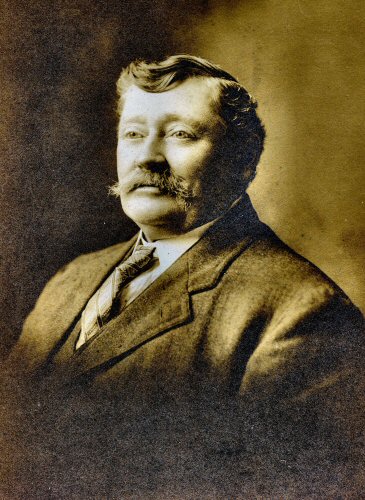Frank Trowbridge Wiswall
- Born:
- Died:
- Burial:
- Parents:
- April 3, 1854 - Marlborough, NH
- January 8, 1945 - Marlborough, NH
- Pine Grove Cemetery, Marlborough, NH
- Henry Trowbridge Wiswall & Ruth Lawrence
[the following short biogarphy was written by Anna Elizabeth Lynch (Robinson)]
These are only bits and pieces I remember, and stories told by my elders. Statistics I will have to look up and record elsewhere.
Gram & Gramp Wiswall lived on Rt. 101 (East Main?) in Marlborough - we used to say " just down over the hill", from where we lived on Terrace Street. When we visited them, we used to "cut cross lots" through a cow pasture on the hill. It took just minutes as opposed to going around by the road. If we were dressed up, as for Sunday School, would go the long way by the road. We couldn't mess up our good clothes by slipping in a cow-flop(flat) or being chased by an irate cow! I can remember the times when I had a new Easter outfit. I would always visit Gram & Gramp, before church or Sunday School, to show them my new clothes.
Gramp Wiswall was a portly man - very large in front. As far back as I can remember, he had very watery eyes - but never wore glasses. However, his eyesight did fail in his later years, and by today's medical standards, probably would have been called almost blind.
He owned numerous woodlots in Marlborough and Roxbury & periodically cut and sold wood from these lots. He kept track of all these lots by walking the boundries at certain times of the year. Very often, Aunt Gladys and Ruthie (if they were visiting) and I would go with him. He would hitch up "Old Peanut" to a one-seated wagon, with a space in the back for Ruthie and I. We sat with our feet dangling from the back. When we came to a hill, Ruthie and I had to get out and walk - too much for old Peanut to lug up the hill! Gramp would park the wagon and we would wait for him to walk the boundary of a lot. This was called perambulating - I believe selectmen still do this today in small towns to keep track of the boundary lines. Each of Gramp's lots, he called by name, probably by the name of the first owner. One such I remember was the "Buss Piece", another was called the "Keyes Place".
Long before we all came of age Gramp gave each one of us a piece of property - he held it and paid taxes on it until we became 21, then it was deeded to us, and we had to pay the taxes, and could do what we wanted with it. Through the years, most of these lots have been sold - only one is left - in Frank's care - however, it is a family lot. It's landlocked, so therefore hard to sell.
Gramp Wiswall also had a fondness for gladiolas. He had quite a large garden in which he set out gladiola bulbs every year. When they started to bloom, he would call mother and have her send me down to help him gather them into bunches, and I would deliver them to ladies in town who were long-time friends. These ladies would even tip me for delivering them. I was in 7th and 8th grade at the time. After his eyesight failed, I had to help him choose the colors which went together in a bouquet, so that they looked nice.
Because of his eyesight, I don't remember of him reading much. Gram must have done this for him. However, the radio was his means of keeping up with the news. He had an Atwater-Kent Radio, and when Gabriel Heatter was on at night with world news, everyone had to stay out of the living room, and be especially quiet, so he could hear every word!
Gramp did have other horses, evidently, as he had a large barn attached to the house, 2 in fact, where there were other stalls. However, while I was growing up, he only had Peanut. He did have numorous wagons though, in the other barn.
I spent more time at Gram & Gramp Wiswall's than I did at the other grandparents, mainly because they were nearer. I guess the boys may have gone more to the farm, to help with haying or the milking.
A brook ran in back of the Wiswall house (Minnewawa) and on the further side was a clay bank. In the summertime, we wadded or hopped across the brook, dug clay and made pots, dishes etc. and put them on the cement bridge rail to dry in the sun - fun!
- Spouse:
- Children:
- Margaret Ellen Mullen - (married - March 1, 1880)
- Ruth Lawrence Wiswall - born 1890
- Gladys Wiswall - born 1898
